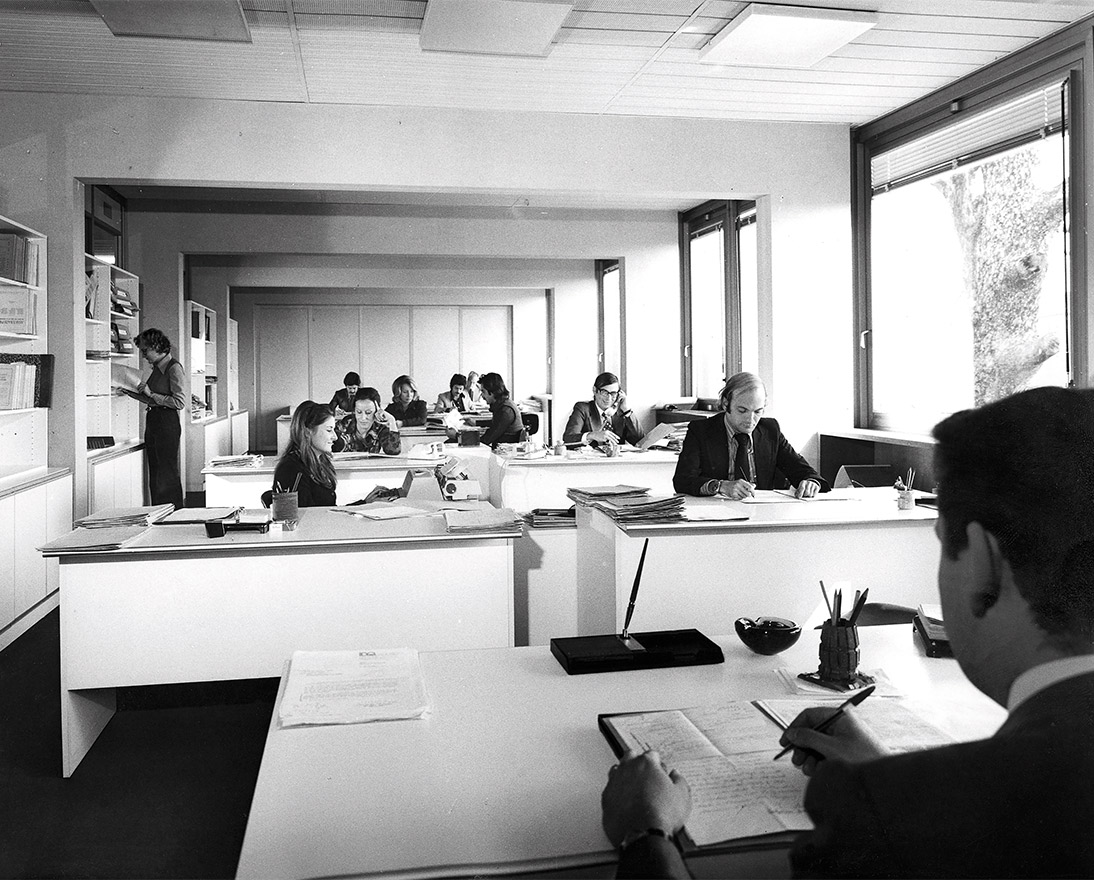Lifers (Part II) The 1980s: Riots, racehorses and earthquakes (and more cigarettes)
PeopleArticleFebruary 17, 202312 min read
What has it been like to work at Zurich for over 40 years? We asked our longest-serving employees around the world how they’ve seen the company culture evolve over the decades.
Zurich, the city and the company, is often known in clichés by those on the outside. Staid, reserved, orderly. As Zurich employees, we know this isn’t true, right? And Zurich, the city, was in an irascible mood in the early 1980s. In fact, the city was burning, or as those years are known locally from a well-known documentary, ‘Züri brännt.’ Students and young people battled with police over funding for alternative arts spaces. It started outside the opera house on May 30, 1980, and spread to the other main thoroughfares around town over the coming months: Bellevue, Limmatquai, Bahnhofstrasse. Windows were shattered, cars burned, tear gas was used by the police, scores were injured, one person was killed, and thousands were arrested.
Bruno Pfister was caught in the middle, metaphorically but also literally. In November of 1979, the 21-year-old started at Altstadt (acquired by Zurich three years later) in customer service, but before that he had considered a career in the police force. On his first day, the general conditions guidelines were dumped on his desk, and he couldn’t make heads or tails of it. “Is this job right for me?” he wondered. The people seemed nice enough, he recalls – and yes, they smoked in the office – but it was all Sie (you, formal) not du (informal). “It was a different culture back then,” says Pfister, now a senior product manager. “Today in the Oerlikon office, it’s always du.”
Out in the streets in 1980 and ’81, the language wasn’t formal or informal, just angry. While driving home after work one evening, Pfister was confronted by a police water cannon on Quai Bridge, one of the most beautiful spots in Zurich. He had to swerve into the tram lane, and then had to be careful not to run over the large stones that were scattered everywhere.
A few weeks later, while heading to a movie, he was faced with police on his left and protesters on the right. He ducked into the theater just in time. “It was better for my health,” he says. “I knew people in the youth scene, and it was not so nice to hear what our police were doing.” At the same time, he didn’t like the approach of the protesters. “I don’t think that’s the way to solve problems.”
A 14-year-old apprentice
Anita Blom-Pozdnik steered clear of the riots altogether. She may have started her apprenticeship at Zurich, in the main Mythenquai office, on April 21, 1980, nine days before the movement began, but she was a mere 14 years old. Plus, she had protective parents, especially her mother, who “had a lot of fear about everything.” They told her the protesters were up to no good and that she should come straight home to Thalwil, a few towns outside the city limits. “It was a conservative environment,” she says.
The young Anita was happy Zurich took her aboard. A prominent Swiss bank wouldn’t on the basis that she was an Austrian citizen. And although she didn’t know much about the company, her father had insurance with Zurich and a sales agent named Ernst Blättler would visit their home once or twice a year. “He was friendly and helpful and knowledgeable,” Anita, now a business performance analyst, remembers. “My father trusted him so much that he told us if something should happen to him, we should get in touch with Mr. Ernst Blättler and ask him for support. I can still picture him.”
She was, like many 14-year-olds, shy and nervous. “I was in awe, like ‘Wow, everything is so big.’ ” With that, she noticed, came hierarchical distinctions within the office – and mostly in the hands of men. In titles, but even in signs and gestures. Normal workers, in her recollection, had chairs without armrests, while managers had armrests – and their own canteen. Different desks, curtains and carpets also conveyed levels of importance.
When Anita turned 15, she committed a gaffe. Her boss asked her to bring a paper to a director for a translation and then added, “Tell him to improve his handwriting so I can read it.” So Anita handed the director the paper and relayed the message. He looked at her aghast. “Did she really say that?” he asked Anita. Yes, she said, and when Anita got back to her boss’s office, she was proud to tell her that she passed on the message. “No, please tell me you didn’t. That was just a joke.” Her boss thought it could have severe consequences. It didn’t. “And his handwriting was better from that day on.” In the following years, there were odd comments and ‘jokes’ along the lines of, “Oh, I’m sick, but if you were laying at my side, I’d feel so much better.” She says, “It was nicely meant in a way, but misguided.”
What was even worse, in her opinion, was always being considered a secretary – even if she was one of the best apprentices, with the highest scores – while the young men had more interesting opportunities. Finally, she said, “ ‘I’m sorry, but I’m much better than this. I’ll be wasted in this job.’ They said, ‘That’s all we have,’ and I said, ‘I don’t believe that.’ I was appalled.” And when word got out, other departments did want her, since she had developed a reputation as a good worker. Even later in the mid-1980s, when she was 19 and met with someone to discuss a new task she was supposed to program, he asked her several times if she was really the programmer and not the secretary. “He couldn’t believe that a woman could program,” she says. When she originally wanted to cut back to 80 percent, she was questioned whether she could still lead her small team. She remembers company parties where male employees could bring their partners, but women couldn’t.
Things have changed a lot since then, Anita says. And she’ll always fondly remember how Zurich supported her during her advanced education. She went to school full-time and was still able to work for the company at 50 percent, putting in those hours on semester breaks and weekends. The company was also supportive when she had children and worked part-time. “Zurich offered me possibilities to combine my education and my family life,” she says. “Plus, I had really good bosses, and I liked my work so it made it easy to stay.”
48 pounds a week in Ireland
Dublin wasn’t burning on June 8, 1981, Paul Croghan’s first day at Irish National, which would eventually be absorbed into Zurich, but there was unrest. The previous year saw 350,000 stream into the streets of the Irish capital to protest high taxation rates. There were strikes, high unemployment and a ‘brain drain’ among young people.
The 20-year-old Paul had been working, but he still felt particularly lucky to get this job, which appeared secure. “And wasn’t I right,” he says today. He was, and still is, in reinsurance underwriting, but back in 1981, his direct colleagues all had worked together since 1952. “So you had to break into this very settled circle,” he says. “People had a very different attitude toward their colleagues back then. They were more like family. Sometimes they actually were family. There was a culture, at least in Ireland, of people getting their family into the company. That doesn’t happen so much today.”
His first salary was 48 pounds a week, but his rent was 25 pounds. Do the math: He had 23 pounds a week to live on. So he’d go to the local pub – Horse Show House – rather than put the heat on in the apartment. “It was my sitting room.” And one that was popular with colleagues. It added to the familiarity in the office. One woman was known as Ms. Tipp-Ex because she used the correction fluid to fix typing mistakes. “It wasn’t in any way insulting, and she embraced the name,” according to Paul. “Another colleague whose real name was Eamon was always called Benjy because he looked like a popular TV soap opera character, and he wasn’t insulted because many of us were better known by our work nickname. But now if I told a colleague that I was going to call them something that’s not their name, I don’t know how they’d respond. Now it’s more business-like and formal.”
In his early days, senior staffers would take off during the day for Leopardstown Racecourse to bet on the horses. They didn’t appear worried that there was no one in the office to cover. One day, Paul was standing outside the office when a carload of them left for the track. His young co-worker, with a bit of macabre humor, said, “You know what, if that car crashes, and they all get killed, I’m the manager tomorrow.”
The combination of familiar and formal showed up in other ways. Shirt and ties weren’t enough for men; you had to wear a jacket as well. And even shoes had to conform. “Sometimes men would wear shoes other than black,” Paul says, “and, I’ll never forget, they would get a tap on the shoulder from their manager who would say ‘Never brown in town.’ In other words, you should be wearing black shoes.”
Barbara Knost in Germany remembers a casual and collegial workplace in the 1980s – and, she says, one that was “unbearably hot in the summer since we were on the fourth floor under a copper roof in the old building on Bonn’s Talweg.” There was never a dress code and, she adds, “It was like a big family with the trainees integrated directly….The annual company party was always good and contributed to the working atmosphere. On Friday afternoons, we ended work early and ate and drank together.”
The ’80s end with a bang
The ’80s ended with two earthquakes, a literal one and another of the geopolitical variety. At 5:00 p.m. on October 17, 1989, Vicki Trindade was driving home from the Farmers Insurance office in Pleasanton, California – east of the Bay Area – to her home in Tracy over the Altamont Pass.
Traffic was light that night since it was about a half hour before the start of Game 3 of baseball’s World Series, which was being played, coincidentally, between the San Francisco Giants and the Oakland A’s for the first time ever. In fact, live coverage of Game 3 from Candlestick Park had just gotten underway on national TV. At 5:04, the video on ABC began to break up and the legendary announcer Al Michaels, losing his famous cool, said “I’ll tell you what, we’re having an earth….” And the signal went off. When the audio portion of the broadcast returned shortly thereafter, he said, in typical California showtime-style, “Well, folks, that’s the greatest open in the history of television, bar none!”
Vicki wasn’t a baseball fan, not at all, and during her drive home she didn’t feel the magnitude 6.9 quake centered to the southwest in Santa Cruz that killed 63 people, injured over 3,000 others, and caused widespread damage. But when she heard about it on the car radio, she says, “I was terrified something might have happened to my baby daughter back home.” It didn’t. “The next day at work was unusual,” says the senior commercial underwriter who started in 1971. “We had to pick up hundreds of files that fell off the shelves and rearrange the items on our desks. Luckily, no one was hurt and damage was very minimal in the office. But it was really strange. We never experienced such a strong earthquake.”
Three weeks later, on Thursday, November 9, there was a tectonic shift geopolitically: the Berlin Wall came down. “I can’t remember what was said between my colleagues,” says Angelika Metternich of the Köln office, “but at the beginning of my training in 1980 at Deutscher Herold [soon part of Zurich] I could not have imagined that the Wall would fall 10 years later.”
“Everyone was surprised that the opening of the border took place so quickly,” says Klaus Baldeweg, an international service team leader who started in 1980 in the Frankfurt office, which at the time was beside the old opera house. “We were all happy about the ‘new’ Germany but were aware that reunification meant a huge financial effort. Nevertheless, the euphoria among the population was very great.”
“I had a flexiday on November 10, and so was only able to speak to my colleagues the following week,” says Ute Stammel, who started in the Köln office in 1977. “Most thought it was good, but of course there were also naysayers.” If not everyone was moved at the time, the aftershocks are still being felt today, more then 30 years later.
From Zurich’s 150th Anniversary Book.
Photo: Open plan office at Austrasse in Zurich (1980s).



